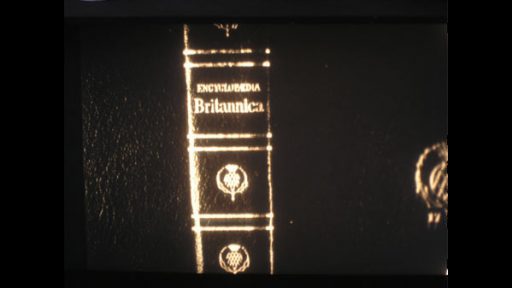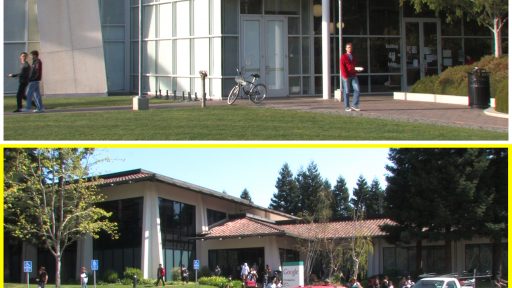Write After Reading
Tuesday 15 April 2014, 7:00pm
Hackney Picturehouse
270 Mare Street
London E8 1HE

Personal footage and self-interrogation are re-appropriated in narratives that blur the lines between documentary, manifesto and fiction. The shifting physicality of the written word in the age of digital surveillance continuously warps and renegotiates notions of the personal and the political throughout this selection of films.
The fallible physicality of memory and the relentless administration of digitisation are often sidelined in the face of so much available information. The sheer heft of an encyclopaedia, the physical effort of turning page after page to retrieve information, now feels quite alien. With 40 years between them, John Latham’s Encyclopaedia Britannica and Andrew Norman Wilson’s Workers Leaving the Googleplex both interrogate the evolving physicality and accessibility of the written word, suggesting the evolution of a selective blindness induced by the presence of an overabundance of data.
Helen Benigson’s The Future Queen of the Screen starts with an old-fashioned, echoing keyboard clang, never letting go of the seductive tactility of the digital interface. Interweaving holiday footage, dance battles and digital avatars, Benigson deconstructs and reconstructs the balance of power between the virtual and the actual until an approximate equilibrium is attained.
Equal parts futuristic dystopia and childhood holiday nostalgia, Daniel Mann’s Future Diaries presents an improbably seamless experiment in narrative dissonance. Created entirely from the artist’s father’s Hi-8 holiday videos, the narrator describes an apparently post-Zionist, post-apocalyptic scenario, superimposed onto the narrative framework of Daniel Defoe’s Robinson Crusoe. Occasionally dipping into the novel itself, the narrative distorts the boundary between the actual, the self-constructed, and the fictive. – Esther Harris
A discussion will follow the screening.

Encyclopaedia Britannica | John Latham | UK 1971 | 16mm | 6 min 10s
For Skoob Tower Ceremony: National Encyclopedias (1966), Latham had constructed towers from volumes of the Encyclopedia Britannica and then burnt them. This film attempts, instead, a precis of the entire encyclopedia, with one frame of film for each page: the history of human knowledge becomes an illegible,strobing stream of images. Courtesy LUX, London

Workers Leaving the GooglePlex | Andrew Norman Wilson | USA 2011 | HD | 11 min 03s
Workers Leaving the GooglePlex investigates a top secret, marginalized class of workers at Google’s international corporate headquarters in Silicon Valley. As I documented the mysterious “yellow badge” Google workers, I simultaneously chronicled the complex events surrounding my own dismissal from the company. The reference to the Lumiere Brother’s 1895 film Workers Leaving the Factory situates the video within the history of motion pictures, suggesting both transformations and continuities in arrangements of labor, class, media, and information.

The Future Queen of the Screen | Helen Benigson | UK 2011 | HD
The Future Queen of the Screen is set in the Dead Sea, Peckham and a cyber desert. The story centres on 2 hip-hop girl dancers who engage in real and online dance battles. The girls both ‘practice’ for the dance competition but also perform live, within the narrative of the video. Notions of performance become visually divided into super-slick HD moving image and bad-quality phone video footage, referencing body language and every-day performances and gestures. In a parallel territory, a girl has cheated on her boyfriend and is floating in the Dead Sea.

Future Diaries | Daniel Mann | Israel 2011 | Hi-8 to DV | 45 min 23s
Future Diaries consists entirely of Hi-8 videos shot by the artist’s father – predominantly during the family’s international travels. The opening sequence states: “In the future, Israel will declare a state of emergency,” and from there on in, the narrator describes a possibly post-apocalyptic scenario, superimposed onto the narrative framework of Daniel Defoe’s Robinson Crusoe. Occasionally dipping into the novel itself, the narrative distorts the boundary between the actual, the self-constructed, and the fictive. The positions of privilege evident in both Mann’s family footage and Robinson Crusoe are ambiguously equated, drawing uncomfortable but inevitable parallels between the political problems of the past and the present.